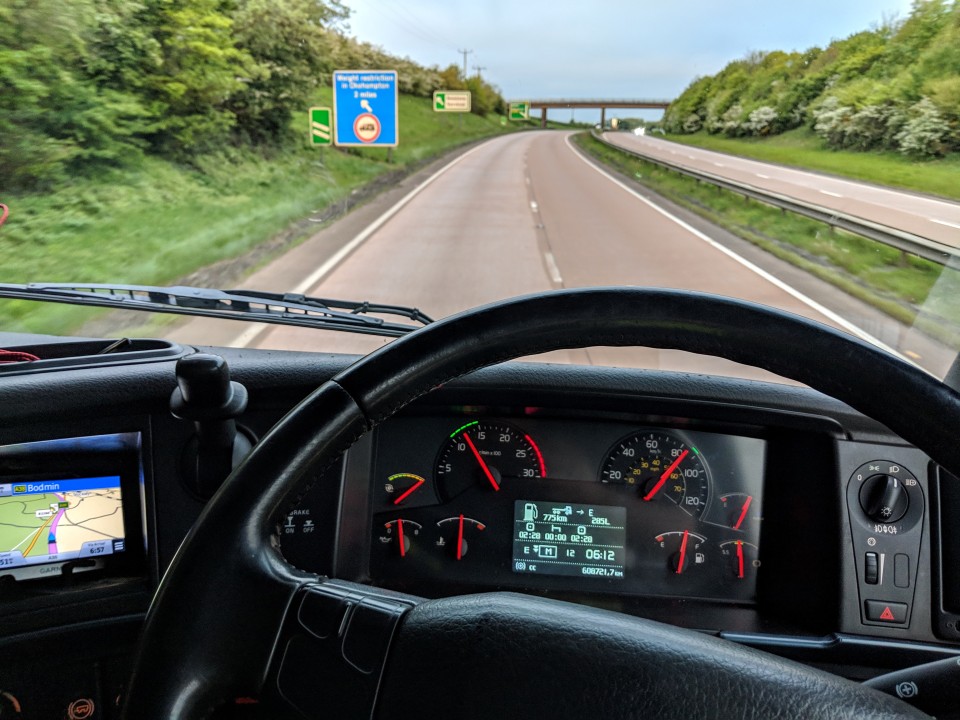
Susie Jones
Как быть здоровым водителем грузовика
Создано: 27.08.2024
•
Обновлено: 27.08.2024
Профессия водителя грузовика требует много времени, сидячего образа жизни и длительных отлучек из дома, что часто сказывается на здоровье многих водителей.
Нездоровые привычки, такие как употребление фастфуда, отсутствие физической активности и нарушенный режим сна, могут привести к потенциальным осложнениям со здоровьем в будущем. Но как оставаться в форме водителю грузовика? Легче сказать, чем сделать, но мы составили список советов, которые помогут вам оставаться на пике формы в дороге.
Шесть главных советов, как сохранить здоровье в дороге
1. Гидратация
Простой совет, который мы часто воспринимаем как должное, однако большинство проблем со здоровьем возникает из-за обезвоживания. Регулярное питье воды или белка в течение дня выведет из организма отходы метаболизма и токсины, придаст вам бодрости и энергии. Держите при себе многоразовую бутылку с водой - это не только напомнит вам о необходимости пить, но и будет полезно для окружающей среды.
2.Диета
Соблазн фастфуда после долгого дня - это то, с чем мы все можем сравнить, однако, как и соблюдение режима питания, ваша диета играет важную роль в вашем здоровье, а также в том, как вы будете чувствовать себя в течение дня.
Водителям грузовиков рекомендуется питаться три-четыре раза в день: либо два приема пищи и два перекуса, либо два приема пищи и один перекус. Старайтесь придерживаться плана питания и перекусов с высоким содержанием омега-3, железа и витамина С, таких как зеленые листовые овощи, рыба и фрукты. Избегайте частого употребления таких продуктов и напитков, как макароны, хлеб, сладкие напитки, а также стимуляторов, таких как кофе и энергетические напитки.
Ознакомьтесь с нашим списком полезных закусок, которые нужно держать в такси:
Батончики с гранолой
Энергетические батончики
Попкорн
Орехи
Сушеные фрукты
Темный шоколад
Помимо покупки здоровой пищи в дороге, иногда полезнее и экономичнее готовить еду. На сайте Frieghtech есть фантастическая подборка рецептов, которые помогут вам придерживаться здорового питания во время работы.
3.Сон
В силу специфики работы водителю грузовика сложно высыпаться, что может привести к катастрофическим последствиям для всех участников дорожного движения.
Простые советы и рекомендации, приведенные ниже, помогут вам хорошо выспаться:
Создайте в кабине обстановку, которая будет напоминать дом. Ознакомьтесь с нашей статьей о том, как превратить кабину грузовика в дом.
Держите место для сна в темноте
Горячий душ: Воспользуйтесь нашей страницей maps, чтобы узнать, на каких стоянках грузовиков есть такие удобства.
Попробуйте несколько приложений, которые помогут вам заснуть
Найдите идеальное место для парковки с минимальным шумом и помехами. Наше приложение intruck предоставляет на выбор 5 000 мест для стоянки большегрузных автомобилей (HGV) по всей Европе, а наша команда SNAP Access and Security может предложить индивидуальные решения по обеспечению безопасности, позволяющие вам спать спокойно, зная, что вы и ваш грузовик в безопасности.
4.Упражнения
Один из самых сложных советов, которому нужно следовать в дороге, но, тем не менее, очень важный. Долгие часы сидения в течение дня могут привести к ухудшению осанки, болям в спине и потенциальным осложнениям со здоровьем. После долгого дня, проведенного за рулем, может возникнуть соблазн сесть и расслабиться, однако 15 минут активного отдыха, например, ходьбы или растяжки, помогут вам почувствовать себя отдохнувшим и менее напряженным.
На сайте HMD Trucking есть несколько полезных упражнений для водителей грузовиков, если вы хотите включить в свой распорядок дня несколько видов физических упражнений.
5.Витамины
Постоянная работа в дороге может затруднить получение всех необходимых витаминов. Ежедневный прием мультивитаминов укрепит вашу иммунную систему и поможет оставаться здоровым.
6.Психическое здоровье
Мы знаем, что забота о физическом здоровье в дороге очень важна, но сколько времени водители грузовиков уделяют своему психическому здоровью?

Благотворительная организация Mind, занимающаяся вопросами психического здоровья, опубликовала статистику, согласно которой 30 % самозаявленных заболеваний, связанных с работой, в транспортно-логистической отрасли вызваны тревогой, одиночеством, стрессом и депрессией. Они также отметили, что эта цифра может быть выше, поскольку большинство людей не обращаются за помощью, которая им необходима. Кроме того, 95% людей, выходящих на работу по болезни, не назовут истинную причину своего отсутствия на работе, если она связана с их психическим здоровьем.
Соблюдение вышеперечисленных советов и рекомендаций может оказать положительное влияние на ваше психическое здоровье. Кроме того, важно вести открытые и честные разговоры с другими водителями грузовиков, начальством или диспетчерами.
Могут ли физические упражнения сделать вас лучшим водителем?
Здоровый образ жизни не только способствует улучшению психического здоровья, но и, судя по имеющимся данным, может сделать вас лучшим водителем. Исследование показало, что водители, которых просили ежедневно заниматься спортом, с большей легкостью поворачивали голову, могли дальше поворачивать свое тело и быстрее садились в машину.
Что самое трудное в работе водителя грузовика?
Одним из самых тяжелых аспектов вождения грузовиков являются долгие часы работы. Дальнобойщикам часто приходится преодолевать большие расстояния и вести антисоциальный образ жизни. Эти долгие километры и асоциальные часы могут привести к нездоровому образу жизни.

Насколько вредна работа водителя грузовика?
Из-за образа жизни многих водителей грузовиков, в среднем, по статистике, у них чаще возникают проблемы со здоровьем, чем у людей других профессий. Дальнобойщики часто сталкиваются с рядом препятствий, таких как тесное рабочее пространство, стрессовые ситуации, необычный режим сна и отсутствие полноценного питания - все это влияет на их здоровье.
Поддержание здорового образа жизни в качестве водителя грузовика требует сознательных усилий, но преимущества этого в целом стоят того. Приведенные выше советы позволят вам взять под контроль свое здоровье и улучшить самочувствие. Следите за другими советами и рекомендациями от нас в SNAP.



